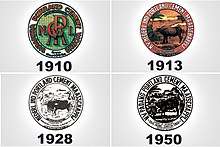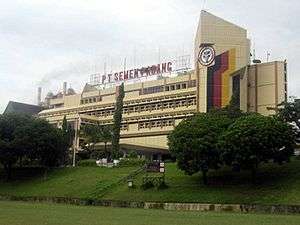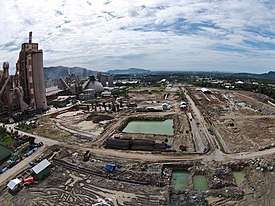Padang Cement
PT Semen Padang is the state-owned company that became oldest cement plant in Indonesia, having been founded in 1910.[2]
 The logo of PT Semen Padang when it was first established until the last time it was controlled by the Dutch | |
Native name | PT Semen Padang |
|---|---|
Formerly | NV Nederlandsch Indische Portland Cement Maatschappij |
| Company | |
| Founded | 18 March 1910 |
| Founder | Carl Christophus Lau[1] |
| Headquarters | , |
Key people | Yosviandri (President Director) |
| Products | Cement |
Production output | 8,900,000 tons/year |
| Owner | Government of Indonesia |
| Parent | Semen Indonesia |
| Website | www |
The company owns the football club Semen Padang F.C.
History
PT Semen Padang (Persero) was established on March 18, 1910 firstly named NV Nederlandsch Indische Portland Cement Maatschappij (NV NIPCM). The Company emerged to be the first cement plant in Indonesia.[2] On July 5, 1958, the Company was nationalized by the Government of the Republic of Indonesia. During this period, the Company started to develop itself by increasing the capacity of Indarung I Plant to 330.000 tons/year. Next, the company developed the capacity of its production by erecting Indarung II, III and IV Plants which, unlike that of Indarung I, apply dry process.[3]
In 1995, the Government shifted its ownership in PT Semen Padang to PT Semen Gresik (Persero) Tbk and in the same year approved the development of Indarung V. Presently, PT Semen Gresik (Persero) Tbk. owns 99.99% of the Company's shares. The rest 0.01% is owned by Koperasi Keluarga Besar Semen Padang. The majority share of PT Semen Gresik (Persero) Tbk. in the Company (51.01%) is owned by the Government of the Republic of Indonesia, while the rest 48.09% owned by public.[3]
Production

Factory Capacity

The total production capacity of PT Semen Padang is 8,400,000 tons/year[4] with details are as follows:
- Indarung II Factory = 860,000 tons / year
- Indarung III Factory = 720,000 tons / year
- Indarung IV Factory = 1,920,000 tons / year
- Indarung V Factory = 3,000,000 tons / year
- Indarung VI Factory = 1,500,000 tons / year
- Cement Mill Dumai = 900,000 tons / year
The Indarung I Factory has been deactivated since October 1999, with consideration of efficiency and pollution. The factory which was established on March 18, 1910 in its production process uses a wet process.
Foot note
References
- Sungkar, Yasmin (2008). "Indonesia's State Enterprises: From State Leadership To International Consensus". Journal of Indonesian Social Sciences and Humanities. Yayasan Obor Indonesia. 1. ISSN 1979-8431.
External links
- Official website
- Padang Cement on Facebook
- Padang Cement on Twitter
- Padang Cement on Instagram
- Padang Cement on YouTube